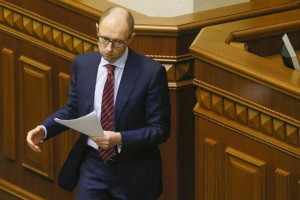
It is easy to forget, since it was never highly emphasized in Western media to begin with (a special exception goes to Forbes.com, which had always looked skeptically and critically at Yatsenyuk, even BEFORE he elevated to his present primary leadership position), but Ukraine’s Prime Minister was a rather uninspiring and non-innovative thinker, whether that be politically or economically. His appeal to Western power brokers was his ability to be pliable, to be worked, to be a ‘company guy.’ Of course, the ‘company’ in question for this discussion was the European Union, not the sovereign national interests of Ukraine.
And that seemed to cause major problems for the ‘new’ Ukraine: the only thing it discussed was whether or not it would follow EU interests or American interests or Russian interests. Its own leader was not apparently striving to carve out and determine what may be truly UKRAINIAN interests and then figure out how those interact and coordinate with the interests of others. This is the high politics formula of foreign affairs and has been so for over a thousand years. Not engaging this formula properly basically means the leader of Ukraine was simply trying to decide which power group to be a vassal state for. This is disappointing, but perhaps not unexpected.
Yatsenyuk was not simply a technocrat (and we all know there has never been a new or innovative idea, EVER, from such types), he was a relatively little regarded technocrat IN HIS OWN COUNTRY JUST SIX MONTHS AGO. At the beginning of the year he trailed in local popularity to figures such as the boxer Vitali Klitschko and the rather wild nationalist leader, Oleh Tyahnybok. This is not exactly inspiring pedigree to pin your political future to as a country. But what Yatsenyuk had was the interest of the European Union and the United States. Again, not because he was particularly awe-inspiring or truly seemed to stand out amongst all possible choices for a better and stable Ukraine: he was the candidate who was most willing to maintain a staunch opposition to whatever maneuvers or initiatives came out of Russia while also not having many independent ideas of his own. And that revealed itself to be one of the major stumbling blocks to closing the chapter on the Ukrainian conflict.
So what did ‘Yatsenyuk’ leadership actually translate to? Basically, economic austerity and political frigidity toward Russia. That’s it. That’s all it was. On the economic side I would be hard-pressed to find any objective financial observer to say Ukraine’s best bet is to look admiringly at what Greece did to itself while trying to follow EU austerity plans and rules. And yet Yatsenyuk’s ideas didn’t evolve much beyond that position. On the political side I would be hard-pressed to find any truly objective foreign affairs advisor that would think ignoring Russia or dismissively pushing away any and all attempts at negotiations and peace-talks that came from Moscow as being sane and rational. But that is what Yatsenyuk did and continued to do repeatedly. Because this was what the EU wanted and he had hitched his wagon exclusively to it.
In America there is an old term that applies to such behavior: pig-headedness. It is something that goes beyond merely stubborn or obstinate. It carries a tinge of irrationality and intimates that such a person can and does do things that may even be detrimental to their own interests, just for the sake of remaining an obstacle or barrier to some other side or group. This is how I would characterize Yatsenyuk’s ‘leadership’: it didn’t really follow reality, nor observe cold, calculated logic, nor seem arranged for Ukraine’s best interests. But they DID stand in the way of working with Russia as a partner where both sides accepted that they had some mutual interests and some conflicting interests. That is why countries come to the negotiating table. That is the fuel of foreign affairs. There is no reason to sit down if everyone already agrees nor is there a point to sit down if all someone intends to do is pig-headedly repeat individual positions with no give and flexibility. This is why Eastern Ukraine STILL sits in such discomfort today: the Prime Minister had no interest working with the side willing to sit down (Russia) while staying ‘true’ to the interests of the ‘partner’ (the EU) that has no intention whatsoever of getting more deeply involved in the impasse. Thus, the emptiness and despair of prolonged and impotent conflict where the victims, in this case the people of Eastern Ukraine, are ostensibly abandoned in real-terms even while their country’s leadership endlessly drones on. Welcome to the vision of a pig-headed technocrat.
It will be interesting to see what will come of this trend now that Yatsenyuk has resigned. For in the end surely this trend must be broken. Hopefully it will not be done with reintensified military conflict and more senseless civilian deaths. And while I have no doubt that Yatsenyuk’s hope was that he could create a more active and financially preemptive European Union ‘coming to his rescue,’ I am more inclined to think that Ukraine’s more realistic best bet would be to accept the reality of disbalanced power and actually try to interact with Russia so that it can achieve a sense of peaceful stability and finally be able to truly govern itself and strive to pull itself out of this political and economic morass.
Then again, maybe the cold harsh light of media scrutiny on how Ukraine is being truly governed is exactly what any of the possible new leaders are afraid of most.
Dr. Matthew Crosston is Professor of Political Science and Director of the International Security and Intelligence Studies program at Bellevue University, exclusively for the online magazine “New Eastern Outlook”.
